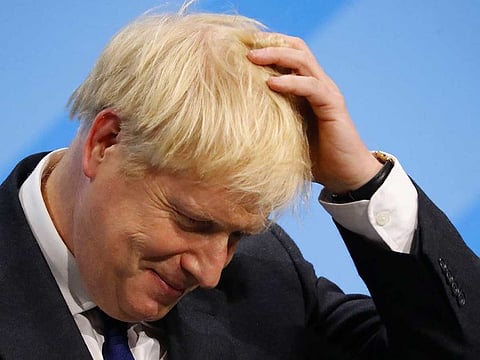Johnson’s majority cut to one after by-election loss
He will find his balancing act more difficult as he seeks to deliver Brexit

London: The anti-Brexit Liberal Democrats won a by-election in Brecon and Radnorshire, reducing Prime Minister Boris Johnson’s House of Commons majority to a single seat and making his balancing act more difficult as he seeks to deliver Brexit by October 31.
Jane Dodds of the Liberal Democrats won 13,826 votes, beating Conservative Chris Davies on 12,401. Dodds overturned Davies’s majority of 8,038, as he stood for re-election even after being recalled in a petition prompted by his conviction for faking expenses claims.
It was the first test at the ballot box for Johnson since he became premier on July 24, pledging to leave the European Union with or without an exit agreement. His government now has a working majority of just one: 310 voting Conservative MPs plus 10 Democratic Unionist Party MPs. Opposition members, including 13 Liberal Democrats, command 319 votes.
“My first act as an MP will be to find Boris Johnson and tell him loud and clear to stop playing with the future of our communities and rule out a no-deal Brexit,” Dodds said in her victory speech. “Let’s get to work.”
Johnson’s strategy has been to commit to leaving the EU “come what may” by the end of October in a bid to win back voters who defected to the Brexit Party in the European elections. The result in Brecon, which is estimated to have mirrored the UK with a 52-48 per cent vote for Leave in 2016, suggests he still has more to do.
Nevertheless, Conservative Party Chairman James Cleverly sought to put a positive spin on the result, pointing out that the contest was tight and that the main opposition Labour Party lost support.
“What we saw was a very close result in a by-election which the Lib Dems were expecting to romp home comfortably,” Cleverly told BBC radio on Friday. As for Labour, “the official party of opposition, who are claiming to be ready to step into the tough job of government, went backwards,” he said.
The win cements the resurgence of the Liberal Democrats, who won 20 per cent of the vote in May’s European Parliament election after seeing their poll ratings decimated following five years in coalition with the Conservatives to 2015. They also have a new leader after Jo Swinson was elected to the post last week. Their national support has been at about 20 per cent in recent surveys.
Des Parkinson of the Brexit Party came third with 3,331 votes with Labour’s Tom Davies on 1,680. Neither Plaid Cymru, which campaigns for Welsh independence, nor the Green Party put up a candidate, instead urging their supporters to vote Liberal Democrat to maximise the chances of sending a “Remain” MP to Westminster.
The threat of Nigel Farage’s Brexit Party to Johnson was clear: had the Conservatives won the votes that went to the Brexit candidate, they would’ve won the seat.
Johnson’s room for manoeuvre is wafer-thin. His predecessor Theresa May’s Brexit agreement with the European Union was defeated three times in the House of Commons, and her successor will need every vote he can get if he is to get any new deal with Brussels through Parliament.
The tight margins have led to speculation that Johnson could call a snap election to secure a bigger majority — or force through a no-deal divorce — but the result in Brecon might give him pause for thought.
John Curtice, professor of politics at the University of Strathclyde and one of the UK’s leading electoral analysts, told BBC radio that the continued viability of the Brexit party could cost the Tories seats, with the Liberal Democrats picking up an additional 40 or 50 in a general election.
While the Tories are recovering in the polls, the “Boris bounce” isn’t yet substantial enough for Johnson to be confident that an early general election would result in parliamentary arithmetic “significantly better than the one that the prime minister is currently going to have to deal with,” Curtice said.



